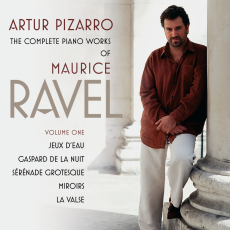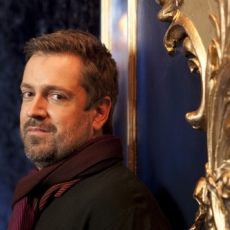Ravel - Pizarro - Atlanta Audio Society
Artur Pizarro gives further evidence that he is one of the best pianists of his generation with a scintillating Ravel recital that gets ever better as it progresses. We begin with the familiar Jeux d'eaux (Fountains), in which we can veritably "see" the play of sunlight on splashing water. In contrast to the impressionism of this piece, we have Gaspard de la Nuit, based on three prose poems by the Symbolist Aloïs Bertrand. The title of the work (literally, "spoiler of the night") implies a nightmare. Actually, there are three of them. First, Ondine, the water nymph who entices the poetic dreamer with a vision of supernatural love beyond anything this world knows, then mocks him, her laughter symbolized by a gust of rain (her element, water) on his windowpane. Le Gibet (The Gallows) is a macabre picture of a hanged man, slowly turning in the afternoon sun. Scarbo is a demon, a succubus who enters the troubled sleeper's room with the evening fog, tears around the room in a manic frenzy, and then settles down in the chimney corner. These evil fairy tales are not easy to realize in musical performance, and every pianist's version is different. I wonder how Pizarro will perform them ten years from now?
The seldom-heard Sérénade grotesque plays like a street impromptu by spectral musicians. (Was it perhaps a take-out from Gaspard?) Pizarro is really in his element in the five impressionist pieces that constitute Ravel's Miroirs (mirrors, though esquisses, sketches, might have been a better title). Noctuelles are moths, flickering around a light. Oiseaux tristes (sad birds) seem too oppressed by the summer's heat to break into song. Barque sur l'Océan focuses more on the watery element than the sailing ship. In this performance we sense the immensity of the ocean, its iridescent beauty, and also its menace - countless lives have perished in it. As a Spaniard, Pizarro is well attuned to the nuances in Alborada del Gracioso (Morning Song of the Fool) with its imitation of a guitar serenade. La Vallée des cloches (Valley of the Bells) reflects Ravel's delight in the sound of distant bells.
Finally, La Valse ends the program on a really smashing note. Pizarro builds the climaxes in this masterful work with great élan. (I confess I almost jumped out of my chair at one stunning keyboard run.) The finale of the piece is a marvel of controlled pandemonium. Bravo, Artur Pizzaro - may we hear more of this wonderful young artist!

